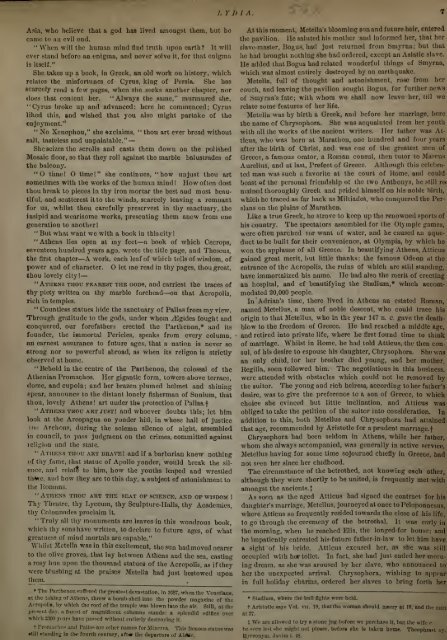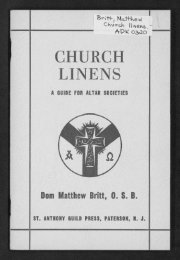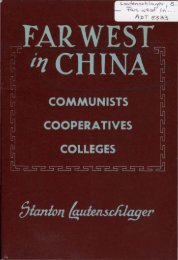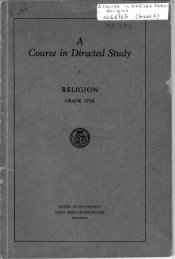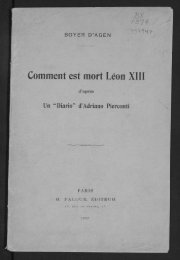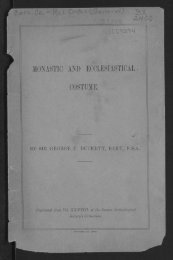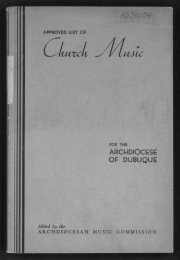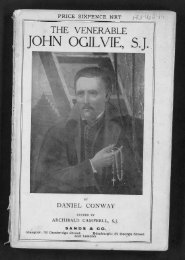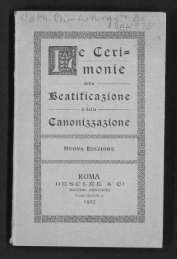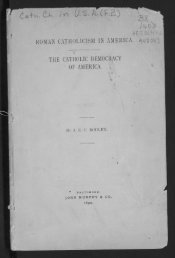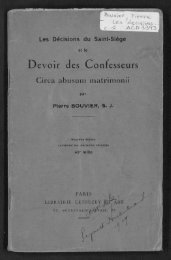Fabiola : or, The church of the catacombs - Digital Repository Services
Fabiola : or, The church of the catacombs - Digital Repository Services
Fabiola : or, The church of the catacombs - Digital Repository Services
Create successful ePaper yourself
Turn your PDF publications into a flip-book with our unique Google optimized e-Paper software.
Asia, who believe that a god has lived amongst <strong>the</strong>m, hut ho<br />
fame to an evil end.<br />
" When will <strong>the</strong> human mind find truth upon earth? It will<br />
ever stand bef<strong>or</strong>e an enigma, and never solve it, f<strong>or</strong> that enigma<br />
is itself."<br />
She takes up a hook, in Qreek, an old w<strong>or</strong>k on hist<strong>or</strong>y, which<br />
relates <strong>the</strong> misf<strong>or</strong>tunes <strong>of</strong> Cyrus, king <strong>of</strong> Persia. She has<br />
scarcely read a few pages, when she seeks ano<strong>the</strong>r chapter, n<strong>or</strong><br />
does that content her. "Always <strong>the</strong> same," murmured she,<br />
"Cyrus hroke up and advanced: here he commenced; Cyrus<br />
liked this, and wished that you also might partake <strong>of</strong> <strong>the</strong><br />
1 '<br />
enjoyment.<br />
" No Xenophon," she exclaims, " thou art ever bread without<br />
salt, tasteless and unpalatable."<br />
She seizes <strong>the</strong> scrolls and casts <strong>the</strong>m down on <strong>the</strong> polished<br />
Mosaic flo<strong>or</strong>, so that <strong>the</strong>y roll against <strong>the</strong> marble balustrades <strong>of</strong><br />
<strong>the</strong> balcony.<br />
"O time! O time!" she continues, "how unjust thou art<br />
sometimes with <strong>the</strong> w<strong>or</strong>ks <strong>of</strong> <strong>the</strong> human mind! How <strong>of</strong>ten dost<br />
thou break to pieces in thy iron m<strong>or</strong>tar <strong>the</strong> best and most beautiful,<br />
and scatterest it to <strong>the</strong> winds, scarcely leaving a remnant<br />
f<strong>or</strong> us, whilst thou carefully preservest in thy sanctuary, <strong>the</strong><br />
insipid and wearisome w<strong>or</strong>ks, presenting<br />
generation to ano<strong>the</strong>rl<br />
<strong>the</strong>m anew from one<br />
" But what want we with a book in this city I<br />
"A<strong>the</strong>ns lies open at iny feet a book <strong>of</strong> which Cecrops,<br />
seventeen hundred years ago, wrote <strong>the</strong> title page, and <strong>The</strong>seus,<br />
<strong>the</strong> first chapter A w<strong>or</strong>k, each leaf <strong>of</strong> which tells <strong>of</strong> wisdom, <strong>of</strong><br />
power and <strong>of</strong> character. O let me read in thy pages, thou great,<br />
thou lovely city!<br />
"ATHENS THOU FKAREST THE OXJDS, and earnest <strong>the</strong> traces <strong>of</strong><br />
thy piety written on thy marble f<strong>or</strong>ehead on that Acropolis,<br />
rich in temples.<br />
" Countless statues hide <strong>the</strong> sanctuary <strong>of</strong> Pallas from my view.<br />
Through gratitude to <strong>the</strong> gods, under whom ^Egides fought and<br />
conquered, our f<strong>or</strong>efa<strong>the</strong>rs erected <strong>the</strong> Par<strong>the</strong>non,* and its<br />
founder, <strong>the</strong> imm<strong>or</strong>tal Pericles, speaks from every column.<br />
an earnest assurance to future ages, that a nation is never so<br />
strong n<strong>or</strong> so powerful abroad, as when its religon is strictly<br />
observed at home.<br />
" Behold in <strong>the</strong> centre <strong>of</strong> <strong>the</strong> Par<strong>the</strong>non, <strong>the</strong> colossal <strong>of</strong> <strong>the</strong><br />
A<strong>the</strong>nian Promachos. Her gigantic f<strong>or</strong>m, towers above terrace,<br />
dome, and cupola; and her brazen plumed helmet and shining<br />
spear, announce to (he distant lonely fisherman <strong>of</strong> Sunium, that<br />
thou, lovely A<strong>the</strong>ns! art under <strong>the</strong> protection <strong>of</strong> Pallas. f<br />
" ATHENS THOU AKT JUST I and whoever doubts this; let him<br />
look at <strong>the</strong> Areopagus on yonder hill, in whose hall <strong>of</strong> justice<br />
lUc Archons, during <strong>the</strong> solemn silence <strong>of</strong> night, assembled<br />
/. }' 1> I A .<br />
in council, to pass judgment on <strong>the</strong> crimes, committed against<br />
religion and <strong>the</strong> state.<br />
" ATHENS THOU ART BRAVE! and if a barbarian knew nothing<br />
<strong>of</strong> thy. fame, that statue <strong>of</strong> Apollo yonder, would break <strong>the</strong> sil-<br />
ence, and retail to him, how <strong>the</strong> youths leaped and wrestled<br />
thrc. iincl how <strong>the</strong>y are to this day, a subject <strong>of</strong> astonishment to<br />
<strong>the</strong> Romans.<br />
" ATHENS THOU AUT THE SEAT OF SCIENCE, AND <strong>or</strong> WISDOM !<br />
Thy <strong>The</strong>atre, thy Lyceum, thy Sculpture-Halls, thy Academies,<br />
thy Colonnades proclaim it.<br />
" Truly all thy monuments are leaves in this wondrous book,<br />
which thy sons have written, to declare to future ages, <strong>of</strong> what<br />
greatness <strong>of</strong> mind m<strong>or</strong>tals are capable."<br />
\\ liil.-t Metella was in this excitement, <strong>the</strong>sun had moved nearer<br />
to <strong>the</strong> olive groves, that lay between A<strong>the</strong>ns and <strong>the</strong> sea, casting<br />
a rosy hue upon <strong>the</strong> thousand statues <strong>of</strong> <strong>the</strong> Acropolis, as if <strong>the</strong>y<br />
were blushing at <strong>the</strong> praises Metella had just bestowed upon<br />
<strong>the</strong>m.<br />
<strong>The</strong> Par<strong>the</strong>non suffered <strong>the</strong> greatest devastation, In 1687, when <strong>the</strong> Venetians,<br />
at Die lakiim<strong>of</strong> A<strong>the</strong>ns, threw a bomb-shell into <strong>the</strong> powder magazine <strong>of</strong> <strong>the</strong><br />
Acropolis, by which <strong>the</strong> ro<strong>of</strong> <strong>of</strong> <strong>the</strong> temple was blown iato <strong>the</strong> air. Still, at <strong>the</strong><br />
lay. a f<strong>or</strong>est <strong>of</strong> magnificent columns stands: a splendid edifice over<br />
which SWO years have pussrcl without entirely rti'stroyiiir; it.<br />
i I'ronni. !n>- : md Pulla- arc ci<strong>the</strong>r names f<strong>or</strong> Minerva. This famous etatue was<br />
till standing in <strong>the</strong> fourth century, aft* <strong>the</strong> departure <strong>of</strong> AlrfMc.<br />
At this moment, Mctella's blooming son and future heir, entered<br />
<strong>the</strong> pavilion, lie saluted his mo<strong>the</strong>r and inf<strong>or</strong>med her, that her<br />
slave-master, Bogus, had just returned from Smyrna; but that<br />
he had brought nothing she had <strong>or</strong>dered, except an Asiatic slave.<br />
He added that Bogus had related wonderful things <strong>of</strong> Smyrna,<br />
which was almost entirely destroyed by an earthquake.<br />
Metella, full <strong>of</strong> thought and astonishment, rose from her<br />
couch, and leaving <strong>the</strong> pavilion sought Bogus, f<strong>or</strong> fur<strong>the</strong>r news<br />
<strong>of</strong> Smyrna's fate; with whom we shall now leave her, till we<br />
relate some features <strong>of</strong> her life.<br />
Metella was by birth a Greek, and bef<strong>or</strong>e her marriage, b<strong>or</strong>e<br />
<strong>the</strong> name <strong>of</strong> Chrysoph<strong>or</strong>a. She was acquainted from her youth<br />
with all <strong>the</strong> w<strong>or</strong>ks <strong>of</strong> <strong>the</strong> ancient writers. Her fa<strong>the</strong>r was At-<br />
ticus, who was b<strong>or</strong>n at Marathon, one hundred and four years<br />
after <strong>the</strong> birth <strong>of</strong> Christ, and was one <strong>of</strong> <strong>the</strong> greatest mm <strong>of</strong><br />
Greece, a famous <strong>or</strong>at<strong>or</strong>, a Roman consul, <strong>the</strong>n tut<strong>or</strong> to Marcus<br />
Aurelius, and at last, Prefect <strong>of</strong> Greece. Although this celebrated<br />
man was such a fav<strong>or</strong>ite at <strong>the</strong> court <strong>of</strong> Home, and could<br />
boast ef <strong>the</strong> personal friendship <strong>of</strong> <strong>the</strong> two Anthonys, he still remained<br />
th<strong>or</strong>oughly Greek and prided himself on his noble birth,<br />
which he traced as far back as Miltiades, who conquered <strong>the</strong> Persians<br />
on <strong>the</strong> plains <strong>of</strong> Marathon.<br />
Like a true Greek, he strove to keep up <strong>the</strong> renowned sp<strong>or</strong>ts <strong>of</strong><br />
his country. <strong>The</strong> spectat<strong>or</strong>s assembled f<strong>or</strong> <strong>the</strong> Olympic games,<br />
were <strong>of</strong>ten parched l<strong>or</strong> want <strong>of</strong> water, and he caused an aqueduct<br />
to be built f<strong>or</strong> <strong>the</strong>ir convenience, at Olympia, by which he<br />
won <strong>the</strong> applause <strong>of</strong> all Greece. In beautifying A<strong>the</strong>ns, Atticus<br />
gained great merit, but little thanks: <strong>the</strong> famous Odeon at <strong>the</strong><br />
entrance <strong>of</strong> <strong>the</strong> Acropolis, <strong>the</strong> ruins <strong>of</strong> which are still standing,<br />
have imm<strong>or</strong>talized his name. He had also <strong>the</strong> merit <strong>of</strong> erecting<br />
an hospital, and cf beautifying <strong>the</strong> Stadium,* which accommodated<br />
20,000 people.<br />
In 'Adrian's time, <strong>the</strong>re lived in A<strong>the</strong>ns an estated Roman,<br />
named Metellus, a man <strong>of</strong> noble descent, who could trace his<br />
<strong>or</strong>igin to that Metellus, who in <strong>the</strong> year 147 B. c. gave <strong>the</strong> deathblow<br />
to <strong>the</strong> freedom <strong>of</strong> Greece. He had reached a middle age,<br />
and retired into private life, where he first found time to think<br />
<strong>of</strong> marriage. Whilst in Rome, he had told Atticus, <strong>the</strong> <strong>the</strong>n consul,<br />
<strong>of</strong> his desire to espouse his daughter, Chrysoph<strong>or</strong>a. She was<br />
an only child, f<strong>or</strong> her bro<strong>the</strong>r died young, and her mo<strong>the</strong>r.<br />
Regilla, soon lollowed him. <strong>The</strong> negotiations in this business,<br />
were attended with obstacles which could not be removed by<br />
<strong>the</strong> suit<strong>or</strong>. <strong>The</strong> young and rich heiress, acc<strong>or</strong>ding to her fa<strong>the</strong>r's<br />
desire, was to give <strong>the</strong> preference to a son <strong>of</strong> Greece, to which<br />
choice she evinced but little inclination, and Atticus was<br />
obliged to take <strong>the</strong> petition <strong>of</strong> <strong>the</strong> suit<strong>or</strong> into consideration. In<br />
addition to this, both Metellus and Chrysoph<strong>or</strong>a had attained<br />
that age, recommended by Aristotle f<strong>or</strong> a prudent marriage, f<br />
Chrysoph<strong>or</strong>a had been seldom in A<strong>the</strong>ns, while her fa<strong>the</strong>r,<br />
whom she always accompanied, was generally in active service.<br />
Metellus having f<strong>or</strong> some time sojourned chiefly in Greece, had<br />
not seen her since her chidhood.<br />
<strong>The</strong> circumstance <strong>of</strong> <strong>the</strong> betro<strong>the</strong>d, not knowing each o<strong>the</strong>r,<br />
although <strong>the</strong>y were sh<strong>or</strong>tly to be united, is frequently met with<br />
amongst <strong>the</strong> ancients. J<br />
As soon as <strong>the</strong> aged Atticns had signed <strong>the</strong> contract f<strong>or</strong> his<br />
daughter's marriage, Metellus, journeyed at once to Peloponnesus,<br />
where Atticus so frequently resided towards <strong>the</strong> close <strong>of</strong> his life,<br />
to go through <strong>the</strong> ceremony <strong>of</strong> <strong>the</strong> betrothal. It was early in<br />
<strong>the</strong> m<strong>or</strong>ning, when he reached Elis. <strong>the</strong> longed-f<strong>or</strong> house; and<br />
he impatiently entreated his-future fa<strong>the</strong>r-in-law to let him have<br />
a sight <strong>of</strong> his bride. Atticus excused her, as she was still<br />
occupied with her toilet. In fact, she had just ended her m<strong>or</strong>n-<br />
ing dream, as she was aroused by her slave, who announced to<br />
her <strong>the</strong> unexpected arrival. Chrysoph<strong>or</strong>a, wishing to appear<br />
in full holiday charms, <strong>or</strong>dered her slaves to bring f<strong>or</strong>th her<br />
* Stadium, where <strong>the</strong> bull fights were held.<br />
t Aristotle says Vol. vii. 18, that Iho woman should marry at 18, and <strong>the</strong> man<br />
at 87.<br />
t We nre nllowcd to try Btone jug be/<strong>or</strong>e we purchase It, but <strong>the</strong> :<br />
be MTU i.-i-t ihe iiiiu'ht not please, bef<strong>or</strong> she in token home. <strong>The</strong>ophrajt oy.<br />
Hyeronyui. Jovim i. 48.


